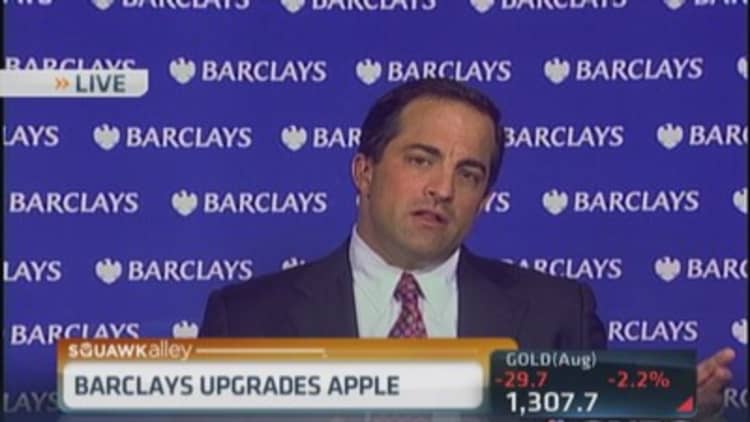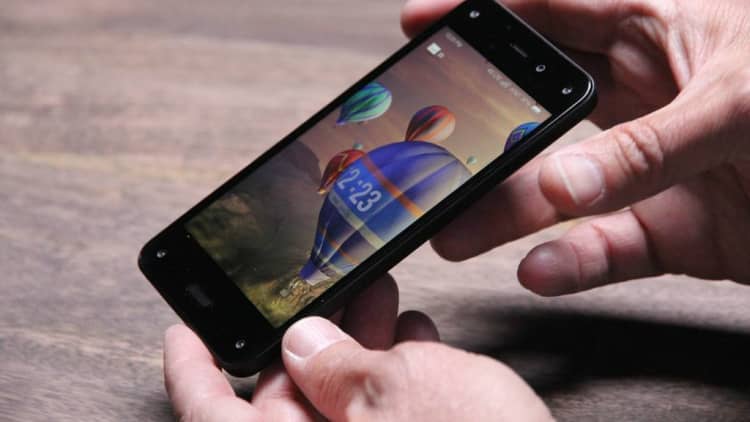When Samsung reports second-quarter earnings on Wednesday, investors will be looking for signs that the company can maintain its lead in the global smartphone market.
Despite recently lowered guidance, analysts expect the South Korean smartphone and electronic device maker to deliver strong results.
"I think Samsung will stay No. 1. A lot of their challenges are with local vendors," said Nick Spencer, ABI Research analyst. His research found that the company sold 113.0 million smartphones in the first quarter of 2014, while Apple sold 43.7 million.
The key to Samsung maintaining its large market share will be finding a way to dominate lower cost smartphones from Chinese companies, whose phones are often rebranded and resold by other providers or carriers, Spencer said.
Analysts cite four areas Samsung will have to improve at some point to retain its edge.
User interface
In order to retain its lead over the long term, Samsung needs to build a platform that's as compelling for app developers and users as Apple, said Robert Cihra, analyst at Evercore Partners.(Cihra is "overweight" on both Samsung and Apple.)
Apple's iOS syncs seamlessly within the company's product line, which makes Apple's platform very attractive for developers. Because of this, Android users have often had to wait until the second or third iteration of an app before it shows up in Google Play.
Read MoreApple could be 'obsolete' in 3 years: Analyst
Other mobile operating systems, such as Windows or the open source Tizen system that Samsung offers, may never see certain apps.
Although most Samsung devices run on Android, earlier this year the Korean company said it would launch the first commercial smartphone using Tizen, an open operating system supported by the Linux Foundation. However, the company announced on Monday that the new device, the Samsung Z, is delayed, raising questions on how strong Samsung's venture into a new operating system actually is.
"Customizing the [user interface] is considered key by manufacturers to build loyalty to its brand and not simply to Android," said IHS analyst Daniel Gleeson. "Without any UI differentiation, descent into a price war, even for high-end smartphones, becomes inevitable. So if Google keeps encroaching on what Samsung perceives as its territory, Tizen offers Samsung a way out."
Analysts said Samsung will never completely abandon Android for Tizen, which is not that different from the Google interface, meaning that a Samsung ecosystem is still distant, despite branding its products as "Galaxy Gear."

One non-Apple company that has done a good job building its own ecosystem is Xiaomi, nicknamed "China's Apple." Building on quality devices and low prices, the 4-year-old company's rapid growth in China is largely attributed to a cult-like following among users.
Although Xiaomi's MIUI interface is Android-based, it lives in the world of Xiaomi apps, while still able to access Google's Play Store. MIUI is also downloadable on other Android phones, furthering Xiaomi's mobile presence.
Customer service
Good communication between users and the smartphone company is crucial to long-term success.
"I think it's a combination," Spencer said. "You can't really separate the two: software and services."
Like Apple's Genius Bar that offers customer support in towns across America, Samsung brings its products and services to U.S. customers with "Experience Shops"—standalone spaces within Best Buy stores that display Samsung products and offer professional help.
According to its website, Apple has 250 U.S. retail stores while Samsung has more than 1,400 U.S. shops from its Best Buy partnership, launched in April 2013.
"Apple's Genius Bar stands head and shoulders above anything its competitors currently offer in the way of support," Gleeson said.
Samsung would not comment on the effect of its Experience Shops but said the partnership provided "richer product user experience through customized services."
Read MoreSamsung managers return part of bonuses: Source
As an online company targeting young people, Xiaomi offers customer service through its user forums, making it easy to fix problems, while adding to the cult of the products. "While in-store support is the best solution in almost every case, Xiaomi's web forum-based solution works because its user base is young and extremely web savvy," Gleeson said.
The OS challenge
Even if Samsung is able to differentiate itself through better customer service and improved user experience, it may face other challenges as it tries to build out Tizen, its first attempt at its own operating system. Many existing mobile operating systems have struggled to take off, or have failed after earlier successes.
For example: Once the gold standard for secure enterprise mobility, BlackBerry failed to upgrade its OS quickly enough after Android and Apple began to surpass them, analysts said.
More recently, Amazon's Fire phone, released July 25, is attempting to attract consumers who are familiar with Amazon.com by offering a product identification and purchase feature. But the Amazon App-only support may dissuade users who depend on Google's email and map services. The Fire phone also got tepid upon release.

The challenges of building an independent OS have prompted rising smartphone companies such as Huawei, ranked third globally behind Apple and Samsung in 2013 according to Strategy Analytics, to stay with Android for most of its devices.
"Certainly other OS could be considered," said Michael Chuang, executive VP of Huawei USA's sales and marketing division. "But we focused on consumers' need and value. Android will continue to be our focus [for the] flexibility of the OS [and] the cost."
So what's Samsung's edge?
Challenges aside, Samsung is still comfortably in the lead for now, with more than double the market share of any other competitor, Spencer said.
The South Korean phone maker has a strong track record, rising from an obscure brand to become a trendsetter, as it pioneered the large-screen smartphone preferred by the big Asian market that Apple will likely tackle with its next iPhone.
More importantly, "Apple and Samsung are the only ones making money," Cihra said.
The premium-device makers have the highest profit margins on smartphones, an IHS study found. Korean competitor LG even ranks below Chinese-operated TCL.
Profit is increasingly important as analysts see a plateauing of the global smartphone market with more than 65 percent of people in advanced markets owning smartphones.
Samsung's income statements as presented by Evercore show that the Korean company makes nearly half its revenue off smartphones, even though the company also makes television sets and other electronic devices.
Read More'China's Apple' lays down challenge to iPhone
"Certainly I'm looking for Samsung's smartphone unit shipments to be up just single digits this year, which is a dramatic slowdown from 50 percent last year," Cihra said. "You grow to become a third of the world's smartphone market and it's hard to outgrow that."
—By CNBC's Evelyn Cheng


